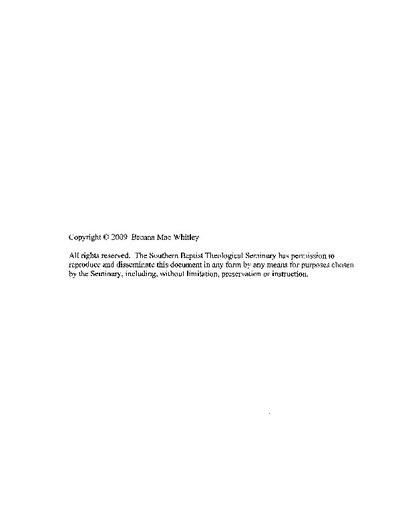| dc.contributor.advisor | Jones, Timothy Paul | |
| dc.contributor.author | Whitley, Brenna Mae | |
| dc.date.accessioned | 2011-06-28T15:12:20Z | |
| dc.date.available | 2011-06-28T15:12:20Z | |
| dc.date.issued | 2009-12-11 | |
| dc.identifier.uri | http://hdl.handle.net/10392/2920 | |
| dc.description.abstract | The thesis of this dissertation is that a biblical framework alternative to the typical models of the relationships between theology and social-scientific research is necessary for discerning the appropriateness of using Erik Erikson's developmental theory, in whole or in part, in the context of Christian discipleship.
Chapter 1 includes evidence of the integration of developmental psychology in Christian education. The chapter then discusses the integration of Erik Erikson's theory of psychosocial development in Christian Education specifically. The chapter concludes with a brief discussion of the significance of Erikson's notion of identity crisis to his own theory.
Chapter 2 introduces David Powlison's Comprehensive-Internal (CompIn) approach as a biblical framework for Christians to mine the field of psychology as opposed to the Vital-Exteral (VitEx) perspectives found in Richard Niebuhr's Christ and Culture . Both Christian counselors and Christian educators frequently advocate integrating psychology with theology for discipleship in the church via a VitEx framework.
Chapter 3 begins the process of employing the three epistemological priorities of the CompIn framework. This first priority is to offer a biblical theological alternative to Niebuhr's typological models of integration. Because Scripture is sufficient for discipleship, the biblical theological alternative offered in this chapter is the means by which the Christian can confidently and faithfully peruse the extrabiblical without reservation.
Chapter 4 focuses on the influence and relationship of Freudian and Darwinist principles upon Erikson's identity crisis. Erikson's beliefs regarding how religion impacts identity are also discussed. The purpose of this chapter is to pursue the second epistemological priority of the CompIn framework: exposing, debunking and reinterpreting Erikson's identity crisis.
Chapter 5 includes three final methods of appropriating Erikson's identity crisis for the purpose of discipleship in the church: (1) to investigate the popularity of Erikson's ideas regarding identity crisis, (2) to discern and report Erikson's methodology, and (3) to propose apologetic appeals that can be made using his ideas regarding identity crisis. | en_US |
| dc.language.iso | en_US | en_US |
| dc.subject | Erickson, Erik H. (Erik Homburger), 1902-1994 | en_US |
| dc.subject | Niebuhr, H. Richard (Helmut Richard), 1894-1962. Christ and culture | en_US |
| dc.subject | Polison, David, 1949- | en_US |
| dc.title | Applying a comprehensive-internal model for the evaluation of social-scientific research to the identity crisis stage of Erik Erikson's developmental theory | en_US |
| dc.type | Electronic dissertation | en_US |

